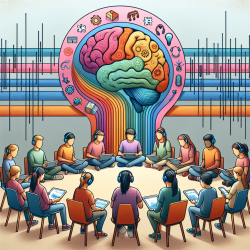The Role of Music in Therapy
Music therapy has shown promise in engaging children with PDOC by stimulating neural networks and encouraging neural reorganization. This is particularly crucial as children with PDOC often have complex needs that require careful sensory stimulation to elicit purposeful responses. Here are some key takeaways from the research:- Familiarity and Emotional Connection: Familiar songs can reduce agitation and cognitive load, making it easier for children to respond positively. Familiar music triggers greater emotional responses and can enhance orientation.
- Live Music Interaction: Live music provides opportunities for social interaction and development, which are critical for children with PDOC.
- Auditory Stimulation: Given the prevalence of visual impairment in PDOC populations, auditory stimuli, particularly music, are more effective in assessment and intervention.
Implementing Music Therapy in Practice
To effectively incorporate music therapy into your practice, consider the following steps:- Personalize the Music Selection: Use patient-preferred music to maximize arousal and attention. Conduct assessments to determine which songs or types of music are most familiar and emotionally resonant for the child.
- Integrate Live Music Sessions: Whenever possible, use live music sessions to foster interpersonal interactions. This can be more stimulating and engaging for the child compared to recorded music.
- Monitor and Adjust: Pay close attention to the child's responses to different musical stimuli. Adjust the loudness, tempo, and complexity of the music to find the optimal level of stimulation.
Encouraging Further Research
While the current research provides a strong foundation, there is a need for further empirical studies to solidify the evidence base for music therapy in treating children with PDOC. Practitioners are encouraged to contribute to this growing field by:- Documenting Case Studies: Share detailed case studies of your experiences with music therapy to help build a repository of evidence.
- Collaborating with Researchers: Partner with academic institutions to conduct rigorous studies that explore the neural and behavioral impacts of music therapy.
- Advocating for Funding: Advocate for funding to support large-scale studies that can provide more definitive conclusions about the efficacy of music therapy for PDOC.
Conclusion
Music therapy offers a promising avenue for improving the lives of children with prolonged disorders of consciousness. By personalizing music selections, integrating live music sessions, and contributing to ongoing research, practitioners can harness the power of music to create meaningful outcomes for their young patients.To read the original research paper, please follow this link: Music in the Treatment of Children and Youth with Prolonged Disorders of Consciousness.










